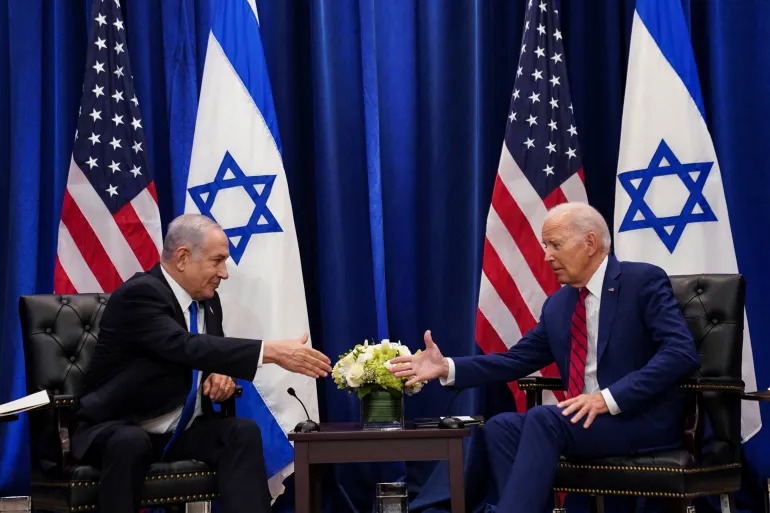Israeli Prime Minister Benjamin Netanyahu and US President Joe Biden met on the sidelines of the United Nations General Assembly, kindling hopes of a groundbreaking diplomatic breakthrough between Israel and Saudi Arabia. The meeting, their first since Netanyahu’s return to power, signaled a potential shift in Middle East relations. Amidst apparent tensions over Israel’s judicial overhaul plan, the leaders expressed confidence in forging a historic peace.
Netanyahu, addressing President Biden, stated, “I think that under your leadership, Mr. President, we can forge a historic peace between Israel and Saudi Arabia.” He emphasized the potential for this peace to resolve the Arab-Israeli conflict, reconcile the Islamic world with the Jewish state, and facilitate genuine peace between Israel and the Palestinians.
The talks unfolded against the backdrop of Israel’s intensifying actions in the occupied territories, drawing condemnation from Palestinian rights advocates urging the US to hold Israel accountable. However, President Biden referred to Netanyahu as a “friend” and showered praise on Israel, asserting, “Were there no Israel, we’d have to invent one.”
President Biden also applauded a newly unveiled initiative to establish an economic corridor from India to Europe, incorporating rail links through Saudi Arabia, the United Arab Emirates, and Israel, calling it a “big deal.”
While few Arab states have recognized Israel since its inception in 1948, the Trump administration brokered agreements in 2020, known as the Abraham Accords, to establish relations between Israel and the United Arab Emirates, Bahrain, Morocco, and Sudan. The call for a similar pact with Saudi Arabia remains on the table, even as Saudi officials reaffirm their commitment to the Arab Peace Initiative.
The Biden administration is additionally pushing to include Israel in its Visa Waiver Program, despite concerns about Israel’s treatment of Palestinian Americans.
Notably, US-Israeli relations have been marred by recent disagreements between Biden and Netanyahu, particularly over Israel’s judiciary overhaul plan. The US president alluded to these differences, emphasizing the importance of upholding democratic values and the path to a negotiated two-state solution.
Furthermore, the US government has criticized Israel’s expansion of illegal settlements in the occupied West Bank and condemned racist comments made by ultranationalist ministers in Netanyahu’s cabinet. The lack of an official White House invitation to Netanyahu had fueled speculation about tensions between the two leaders, though US officials stress unwavering support for Israel, which receives substantial military aid annually.
Reporting from UN headquarters, Al Jazeera’s diplomatic editor James Bays highlighted that the meeting with Netanyahu was a sensitive issue for the Biden administration. The compromise was to hold the meeting on the sidelines of the UNGA rather than in the White House.
As the leaders convened, Jewish-American and Israeli demonstrators gathered in New York, waving Israeli flags to voice their objections to the judicial overhaul plan. Many protesters questioned the necessity of Biden meeting with Netanyahu. Later, the White House announced that President Biden had invited Netanyahu to visit Washington, DC, before the year’s end, continuing their direct collaboration.
















